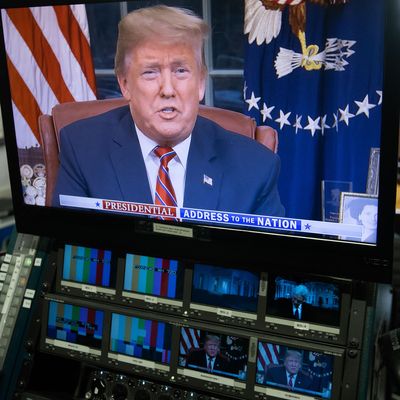
In a short, uncharacteristically non-meandering speech to the nation from the Oval Office punctuated by loud sniffing, President Trump depicted illegal immigration as an urgent crisis. In place of cogent policy arguments, Trump substituted his familiar anecdotes about immigrants rampaging the countryside to commit a series of grisly crimes against law-abiding Americans.
A more realistic assessment was provided by administration officials, who told the Washington Post (as the Post reporter put it), “Trump believes forcing a drastic reckoning by executive action may be necessary given the Democratic resistance and the wall’s symbolic power for his core voters.”
Two words in that sentence, symbolic power, tell you everything you need to know about Trump’s motivation. A symbolic goal is the opposite of a crisis.
The lack of a wall is a crisis for Trump, of course, because it is his most famous policy goal — for many of his voters, probably the only one that springs to mind. Failure to fulfill it may hurt him badly in 2020. It is not rationally connected to either illegal immigration nor to crime. The administration recently claimed 4,000 suspected terrorists crossed the southern border in the first half of last year. The actual number is six.
Amazingly, it is not even a goal Trump himself has pursued with any urgency until this last December. He devoted almost no effort to securing wall funds during the two years when his party enjoyed full control of government (during which he might have leveraged Republican desperation for corporate tax cuts to force them to fund his wall). His 2019 budget proposed to spend just $1.6 billion more on border security — which is to say, he is now demanding Congress give him three times as much as he asked for in his own blue-sky plan. As recently as December 19, he told Congress he would sign a clean bill to continue government funding with no additional fencing.
Trump shut the government down in an impulsive fit, failing to anticipate either the pain the shutdown would create nor any strategy for escaping it. Typically, shutdowns create a political backlash against either the party that is refusing to reopen government absent some political demand (because they’re the ones who won’t simply restore the status quo ante) or the president (because Americans tend to hold presidents accountable). In this case, those are both the same person. Indeed, Trump closed off any chance of winning the debate at the outset by claiming responsibility for the shutdown and even promising not to blame it on his opponents.
In lieu of any leverage, Trump could only assert, “I have invited congressional leadership to the White House to get this done.” He repeated the last three words slowly for emphasis, but it will only serve to underscore his own impotence.
The apparent logic of his speech was that the force of presidential rhetoric would rally the public to his side. But Trump could not even maintain the appearance of believing such a fanciful story. In an astonishing comment to reporters beforehand, the president confessed he didn’t want to give the speech or take a planned trip to the border. “It’s not going to change a damn thing, but I’m still doing it,” he said, adding that “these people behind you” — pointing to his communications staffers — “say it’s worth it.”
It’s unlikely even a highly articulate, popular president could escape the mess Trump has created for himself. Trump is none of these things.






























